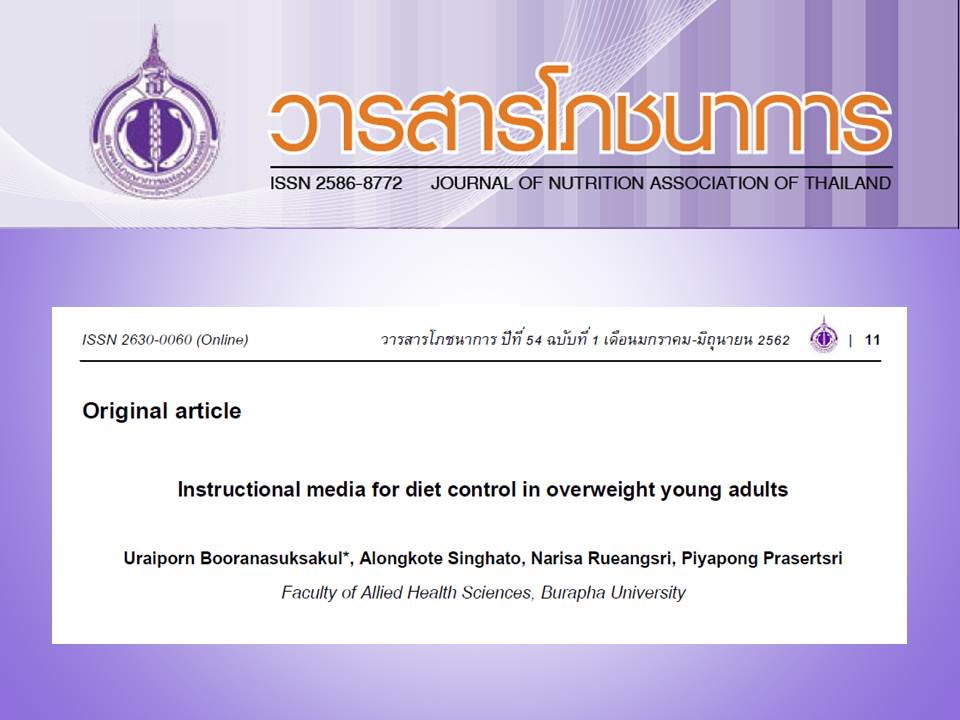Food Instructional Media to Diet for Overweight Youth
Keywords:
ภาวะน้ำหนักเกิน, สื่อการสอน, การควบคุมอาหารAbstract
Overweight and obesity are the major health risk factors of the world population. Obesity is getting energy intake more than energy output per day for a long period. Producing instructional media for counting food energy and nutrients may be the guideline for controlling the energy intake of food per day for obese prevention. This research studied in 30 University students with overweight (Body mass index: BMI; 22.9 - 24.9 kg/m2). This study was divided into 3 periods; the first period was the surveillance of popular food near Burapha University; the second was creating the food instructional media; the third period was intervention by food instructional education. The participants were tested the nutritional knowledge before, after intervention and one week follow up after intervention. The evaluation of instructional satisfaction was collected only after intervention. The results were shown that the nutritional knowledge of participants after intervention and follow up one week were significantly higher than before intervention (p <0.05). There was the high score average of satisfaction for the instruction. In conclusion, the instructional media, to educate the control of dietary energy for youth with overweight, improved nutritional knowledge after intervention and one week of follow-up.
References
2. Ng M, Fleming T, Robinson M, Thomson B, Graetz N, Margono C, et al. Global, regional, and national prevalence of overweight and obesity in children and adults during 1980-2013: a systematic analysis for the Global Burden of Disease Study 2013. The Lancet. 2014;384(9945): 766-81.
3. Pengpid S, Peltzer K. Prevalence of overweight and underweight and its associated factors among male and female university students in Thailand. HOMO-Journal of Comparative Human Biology. 2015;66(2):176-86.
4. Hudthagosol C, Chusak C. Sugar and diabetes. Journal of Nutrition Association of Thailand. 2015;50(2):26-35.
5. Crino M, Sacks G, Wu JH. A review of population-level actions targeting reductions in food portion sizes to address obesity and related non-communicable diseases. Current Nutrition Reports. 2016; 5(4):323-32.
6. de Mutsert R, Sun Q, Willett WC, Hu FB, van Dam RM. Overweight in early adulthood, adult weight change, and risk of type 2 diabetes, cardiovascular diseases, and certain cancers in men: a cohort study. American Journal of Epidemiology. 2014;179(11):1353-65.
7. Worsley A. Nutrition knowledge and food consumption: can nutrition knowledge change food behavior?. Asia Pacific Journal of Clinical Nutrition. 2002;11:579-85.
8. Wardle J, Parmenter K, Waller J. Nutrition knowledge and food intake. Appetite. 2000;34(3):269-75.
9. Grosso G, Mistretta A, Turconi G, Cena H, Roggi C, Galvano F. Nutrition knowledge and other determinants of food intake and lifestyle habits in children and young adolescents living in a rural area of Sicily, South Italy. Public Health Nutrition. 2013;16(10):1827-36.
10. Jung H, Chung K. Knowledge-based dietary nutrition recommendation for obese management. Information Technology and Management.2016;17(1):29-42.
11. Boonju W, Chulakarangka S, Utaipatana-cheep A. Nutrition education to encourage school children’s behavior on Thai food consumption. Journal of Community Development Research. 2008;2(2):8391.
12. Wongsawat S. Integrating Posters and Actual-Sized Fruit Models in Health Education on Fruit Diets for Elderly Patients. International Journal of Arts & Sciences. 2015;8(3):717-24.
13. Cho JH, Juon HS. Assessing overweight and obesity risk among Korean Americans in California using World Health Organization body mass index criteria for Asians. CDC. 2006;3:1–11.
14. Carnell S, Benson L, Pantazatos SP, Hirsch J, Geliebter A. A modal brain activation and functional connectivity in response to high‐energy‐density food cues in obesity. Obesity. 2014;22(11): 2370-8.
15. Sharma SV, Gernand AD, Day RS. Nutrition knowledge predicts eating behavior of all food groups except fruits and vegetables among adults in the Pasodel Norte region: QuéSabrosa Vida. Journal of Nutrition Education and Behavior. 2008;40(6):361-8.
16. Klohe-Lehman DM, Freeland-Graves J, Anderson ER, McDowell T, Clarke KK, Hanss-Nuss H, Cai G, Puri D, Milani TJ. Nutrition knowledge is associated with greater weight loss in obese and overweight low-income mothers. Journal of the American Dietetic Association. 2006; 106(1):65-75.
17. Pirouznia M. The association between nutrition knowledge and eating behavior in male and female adolescents in the US. International Journal of Food Sciences and Nutrition. 2001;52(2):127-32.
18. Shin EK, Lee HS, Lee YK. Effect of Nutrition Education Program in Obese Children and Their Parents (II): Focus on Nutrition Knowledge, Eating Behaviors, Food Habit and Nutrient Intakes. Korean Journal of Community Nutrition. 2004;9(5): 578-88.
19. Weiss EM, Kemmler G, Deisenhammer EA, Fleischhacker WW, Delazer M. Sex differences in cognitive functions. Personality and individual differences. 2003;35(4):863-7ใ

Downloads
Published
How to Cite
Issue
Section
License
Upon acceptance of an article, copyright is belonging to the Nutrition Association of Thailand.


